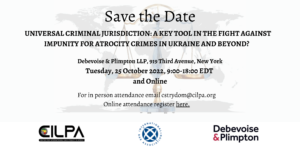Co-sponsored by the University of Makeni.
Friday, 21 January 2022: 9:00 am – 3:00 pm GMT, Radisson Blu Mammy Yoko Hotel, Freetown and Via Zoom
The Center for International Law and Policy in Africa (CILPA) and the University of Makeni convened a symposium at Radisson Blu Hotel Mammy Yoko Hotel, Freetown, on the review of Sierra Leone by the United Nations Human Rights Council. The symposium discussed the UN Human Rights Council recommendations made to Sierra Leone in the Third Periodic Review of Sierra Leone in May 2021 and afforded government officials opportunities to engage with Sierra Leonean academia, civil society, and other partners on the recommendations made and the national plans on how best to implement what has been accepted.
As part of a wider reform process of the United Nations human rights system, in 2006, the United Nations General Assembly adopted Resolution 60/251 reaffirming that all human rights are universal, indivisible, interdependent and mutually reinforcing. In operative paragraph 1, the resolution established the Human Rights Council as a subsidiary organ of the General Assembly to promote universal respect for the protection of human rights without distinction of any kind. The Council, which is comprised of a representative group of 47 UN member states elected based on equitable geographic distribution, today plays a pivotal role advancing state compliance with human rights obligations under international law. A key innovation is the Universal Periodic Review (“UPR”) of all UN member states. All states, not just rights violators, report on their human rights record once every four or five years.
On 12 May 2021, Sierra Leone, which is a State party to several human rights treaties, appeared for the third time before the UN Human Rights Council in Geneva. This peer, instead of expert review, was carried out by the 47 Council members acting as a working group. Three States (namely China, Libya and Mexico), which were selected by lot, served as the troika for Sierra Leone’s third review. The materials reviewed included the government’s report, along with a compilation of information from UN mechanisms such as the treaty bodies and special procedures as well as information submitted by NGOs, national human rights institutions, academic institutions, etc.
During the third UPR, where Sierra Leone was represented at a high level with several ministers from foreign affairs, justice, and gender and women’s affairs participating from capital as well as diplomats accredited to Geneva, 102 UN member states engaged with Sierra Leone’s human rights record. Many delegations complimented Sierra Leone for the significant efforts made to improve human rights since the last periodic review in 2016. Some concerns nonetheless remained about human rights issues in Sierra Leone, including freedom of expression, freedom of peaceful assembly, as well as accountability for alleged excessive use of force by police as well as the need for proactive measures to address gender equality including through legislation. A total of 274 recommendations were ultimately presented for the government’s consideration. Sierra Leone, in its official response in September 2021, supported the overwhelming majority of the peer recommendations, while it took note of a number of others that required further deliberation due to their cultural sensitivity.
Besides the Sierra Leone government’s significant commitment to abolish the death penalty, which was made at the final UPR meeting, Sierra Leone pledged to engage with its population on the recommendations received during the third periodic review. It thereafter proceeded swiftly to eliminate the death penalty, with the passage of national legislation by Parliament in October 2021 and the President signing it into law the same month.
While Sierra Leone has made progress in the advancement of human rights, with the abolition of the death penalty standing as the most visible example, concerns remain regarding the implementation of the substance of the remaining UPR recommendations accepted by government. A key first set of considerations related to the next phase is how government now plans to work, with its various departments, to prepare for implementation of the additional recommendations it has formally accepted to implement before the next UPR several years from now.
A second important aspect concerns what role there is for the Sierra Leonean public including academia, the NGO community and civil society, as well as private sector and development partners, to contribute to the process of strengthening the enjoyment of human rights of Sierra Leoneans going forward. Indeed, during the HRC’s third review in 2021, government pledged to carry out a full national consultation involving civil society organizations, universities, women and youth groups, inter-faith bodies, and other stakeholders.
It is against the above backdrop that CILPA and the UNIMAK were pleased to convene and facilitate this timely dialogue of relevant stakeholders, a continuation of a collaboration initially began with the Sierra Leone Bar Association, with the view to providing a public, inclusive and transparent forum for a national conversation on the legal and policy aspects of the development of human rights in Sierra Leone over the next few years.

